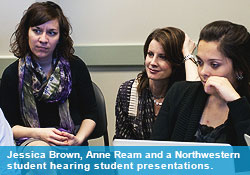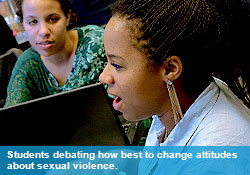Workshop 1:
Unsilencing Public Policy: Creating Programs That Create Change(an interactive presentation and workshop)



To find out more about bringing "Unsilencing Public Policy" to your school or social services agency, email us.
Workshop 2:
The Stories We Tell: A two-day testimonial writing workshop for survivors of sexual violence, domestic violence and trafficking.We believe that every woman's story has power and purpose, which is why The Voices and Faces Project launched The Stories We Tell, the country's first testimonial writing workshop for survivors of sexual violence, domestic violence and trafficking. The workshop was created by R. Clifton Spargo, an award-winning fiction writer and Arts Fellow at the Iowa Writers' Workshop and is facilitated by Voices and Faces Project Founder Anne K. Ream. Over the course of our two-day workshop, participants consider testimonial writing by Sandra Cisneros, Charlotte Pierce-Baker, Primo Levi, Martin Luther King, Jr. and Adrienne Rich, among others, and take part in a series of innovative writing exercises. "I am still reeling from what an incredible experience this workshop was for me," noted one of our participants in the post-workshop evaluation. "The instructors created an atmosphere of intellectual challenge and engaged and inspired learning, and a connection to a greater purpose. Most striking was how balanced the educational component was with the emotionally supportive environment." Read more about our writing workshop and its Chicago debut.
To find out more about bringing “The Stories We Tell” to your city or region, or to support this first-of-its-kind program, email us.
Workshop 3:
Can You Hear Me Now? Rethinking our use of language to realize social change (an all-day workshop).Twitter. Facebook. 24/7 News. The worldwide web. We have more ways and places to communicate than ever before in human history. So why is it often so difficult for non-profit organizations to be really heard? Kemery Bloom of Grit, LLC has partnered with Anne K. Ream of The Voices and Faces Project to explore that very question - and to offer practical tools for non-profit organizations seeking to revitalize their current messaging strategies in order to realize true social change. Can You Hear Me Now is an all-day, interactive workshop that will provide "tools that you can use" to get the right organizational message to the right audience in order to create change. Ream and Bloom kick off the workshop by considering some of history's and today’s most successful social movements, exploring how strategy and communications have played a key role in their effectiveness. They then consider contemporary models that we can learn from, engaging workshop attendees in a facilitated group discussion about what's working (and what's not) for their own organizations. Can You Hear Me Now is also a workshop that considers how our current media landscape provides unprecedented opportunities for organizations to build their non-profit "brand," even when on a limited (or non-existent) communications budget. Find out more about Can You Hear Me Now.
Lecture 1:
Be a Storyfinder: Writing about the injustices we've lived or witnessed.Debuting at Northwestern University's Center for Global Engagement at the Buffett Center for International and Comparative Studies, where Voices and Faces Project founder Anne K. Ream spoke to a student and faculty audience that would soon be working with United Nations NGOs around the globe, "Be a Storyfinder" uses a series of survivor stories collected by The Voices and Faces Project to explore ways other activists and writers can document related human rights realities in the US, and beyond.
Considering how individual stories can be used to change minds, hearts and public policies on gender-based violence, and examining the important ethical considerations all documentarians must grapple with, Ream considers how finding “the story” is not enough -- we must also use new and traditional media vehicles to get the story “out there” in our information-overloaded age. Giving special emphasis to the story of the women of Atenco, Mexico, victims of rape and political torture recently interviewed by Ream, and Voices and Faces Project photographer Patricia Evans, "This workshop explores the unique challenges faced when covering high profile, high-risk stories. Anne Ream delivered a fresh perspective on both the power and danger of storytelling. Students were captivated by her passion and enlightened to the possibilities of using storytelling to make a difference," noted Nicole Patel, Program Manager at the Center for Global Engagement at the Buffett Center for International & Comparative Studies at Northwestern University.
Lecture 2:
Language, media and the law: Re-thinking our ways of talking about sexual violence in the public squareDespite 30-plus years of anti sexual violence advocacy, many in the media continue to perpetuate damaging myths about rape. Coverage of several recent high profile cases has been telling. Whatever the specifics of these cases, the message sent was constant: women who come forward with rape charges should prepare to be put on trial, not only in the courtroom, but also in the court of public opinion, often via the media. In popular culture, rape jokes abound. False accusation "storylines" have become a fixture in TV and film. Music that celebrates violence against women is too often the norm.
In short, we are losing the “message” wars in free and paid media, and it is costing us -- and the victims we are here to support and help -- mightily.
Though it might be argued that violence against women is an issue that many in the public are likely to avoid confronting despite our best efforts, members of The Voices and Faces Project argue that we in the women's movement have not developed an effective "language" around issues of rape and abuse, one that speaks to those outside of the movement as effectively as it speaks to those of us within it. In "Language, Media and the Law," prosecutor Roger Canaff and Anne Ream challenge the rape crisis community to re-think terms that fail to call the public to action, and provide real-world suggestions for how those in the women’s movement can re-claim the public discussion on sexual violence against women.
Lecture/Slide Program 3:
From the inside: Listening to rape survivors, learning how to better respondIn "From the Inside," an interactive lecture/photography program updated in 2010 with new survivor stories and fresh insights, the audience will encounter the stories of 10 diverse, dynamic survivors of rape, and hear what helped (and hindered) each of them as they sought justice and worked to rebuild their lives. “Listening to Survivors” challenges the general public to re-think who survivors are, what they need and how we can make a difference in their lives. Considering a series of powerful, personal stories that have been shared with her, Voices and Faces Project research director Katie Feifer -- herself a survivor of rape - explores the responses of a broad range of communities to victims of sexual violence -- including communities of faith and our legal system. Feifer also considers how outdated notions of “healing” can hold survivors back. "Listening to survivors" is a lecture/slide program that is as moving as it is powerful: a call to the general public for greater action, and compassion.
Lecture/Slide Program 4:
Media Matters: Practical guidelines for responding to high-profile sexual violence casesSexual violence impacts one in four women and one in six men, and its "ripple effect" on our families, workplaces, and communities is profound and far-reaching. Yet many in the media continue to perpetuate damaging myths about rape, while "blaming the victim." In "Media Matters," Anne K. Ream and Katie Feifer explore how we can change that, positing that initiating a strategic and creative dialogue with editors, journalists, and opinion shapers is critical to impacting media coverage. Using “real-world” case studies and examples of what works (and what doesn’t) when responding to high-profile media cases, and exploring how “new media” vehicles -- and user generated content -- can "change the game" for the anti-violence movement, this interactive lecture/slide program provides "tools that can be used" by advocates, allies, prosecutors and law enforcement personnel dealing with the media in their work.

